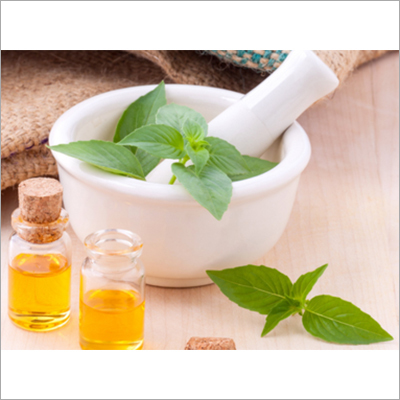Basil is commonly known as Tulsi in India. It has been widely used in
traditional Ayurvedic medicines as it has natural healing and immunity properties.
There are 18 types of Basil, out of which most commonly used for essential oils
are Krishna Tulsi (Ocimum tenuiflorum), Sweet Basil (Ocimum basilicum) and
Basil Linalol (Ocimum basilicum ct. linalool). Basil oil is extracted via steam
or hydro-steam distillation. Krishna Tulsi has purple fringed leaves and purple
stems. Sweet basil plant has bigger green color leaves and stems.
Basil is a sacred plant in many countries including India. In the
Mediterranean area it is grown around the house to confer protection and keep
away flies. In Greece a pot of basil is often found outside houses and shops.
In India Tulsi is so valued that it has acquired the moniker “the elixir of
life”. The plant is considered sacred in
Hinduism and is offered to Lord Vishnu and his many forms. The leaves are seen
as the presentation of Goddess Lakshmi. The plant is often found outside Hindu
homes.
Basil is also regularly used in cuisines and recipes all over the world. It
is popular in Europe, Central Asia, India and Southeast Asia and is extensively
used for culinary purposes in the Mediterranean region and still forms active
ingredient many Italian recipes such as pesto, pizza, pasta and salads.
Basil essential oil has become quite popular in recent years because of it because of its antiseptic properties that help in curing acne breakout; improve blood circulation, ward of skin irritation, small wounds and sores. The goodness of vitamin C boost skin cells metabolism an elasticity which further helps to reduce wrinkles and fine lines. Basil is a wonderful choice for a natural remedy to clear out pores and to get a naturally glowing skin. Basil oil also helps to clear dandruff. Massaging basil oil with mixed with a carrier oil helps to elevate itching, increases blood flow and make the hair roots healthy.
Basil essential oils
carminative property helps to release intestinal gas thereby facilitating the
release of uneasiness associated with poor digestion and constipation. Basil essential
oil is effective in providing relief from cold, influenza and associated fevers.
Along with its function in relieving cough it can also be used to treat asthma,
bronchitis and sinus infections. It is considered antibacterial and antiviral
and also access and expectorant.
Basil essential oil is
ideal for soothing or eliminating headache, fatigue, sadness and for inspiring psychological
endurance. Basil oil helps promote mental clarity and increases
concentration and alertness. It is used for treating nervous tension, mental
fatigue, melancholy, migraine
and depression. It clears the head, relieves intellectual fatigue and gives the
mind strength.
Basil essential oil can
be used to prevent vomiting particularly occurring due to motion sickness.
Basil is also considered a cooling herb and is used for rheumatic pain and irritable
skin conditions. Basil essential oil is also used as an insect
repellent.
Basil oil is used as a fragrance component in colognes and perfumes; some use in pharmaceutical
preparations like cough syrup and low level use uses in major food products
especially baked goods. the oil is also used in soaps and cosmetics.
Basil oil blends well
with Bay, Bergamot, Black Pepper, Chamomile Roman, Clary Sage, Coriander Seed, Cypress,
Eucalyptus, Sweet Fennel, Geranium, Ginger, Grapefruit, Juniper Berry, Lavender,
Lemon, Lemongrass, Sweet Marjoram, Orange, Oregon, Palmarosa, Peppermint, Petitgrain, Rosemary, Spearmint,
Tea Tree, Lime, Yang Ylang.
Tulsi leaves have mercury in them and they are acidic in nature, which can
cause your teeth enamel to wear off soon since your mouth is alkaline. It has
to be had with boiled water, curd and honey.
Basil essential oil and basil in any other form should be avoided by
pregnant, breastfeeding, or nursing women. If you're considering using basil
essential oil for any health purpose, make sure to consult your physician
first. Basil essential oil should not be taken internally without the
supervision of a health professional. Internal use of basil essential oil may
have toxic effects. In addition, some individuals may experience irritation
when applying essential oils to the skin. A skin patch test should be done
before using any new essential oil.
We at Sugandhāḍhya can provide you Tulsi essential oil and Aura
(tulsi-chandan) dhoopcones and dhoopsticks.


very nice krutika !!!!
ReplyDeletemeera
Congratulations Krutika very nicely done and detailed
ReplyDelete